RESERVOIR DOGS: The Power of its Homoerotic Subtext 20 Years Later
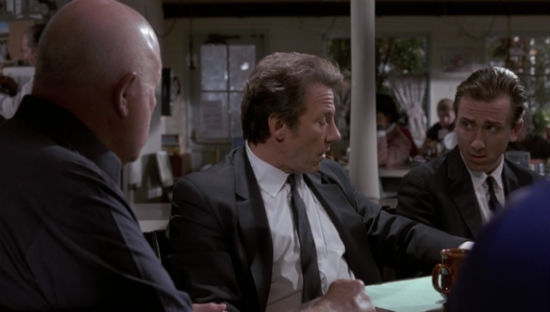
Mr. White winks at Mr. Orange.
Author’s note: the content of this editorial contains numerous “spoilers”.
“Gay subtext always makes every movie better.” – Quentin Tarantino
The brilliance of Quentin Tarantino’s Reservoir Dogs is exemplified by the profound and intimate relationship portrayed between “Mr. Orange” (aka Freddy Newendyke) and “Mr. White” (aka Larry Dimmick). Through the lens of their interactions, the film explores our cultural perception of masculinity and how male sexuality is intimately entwined with violence. In fact, violence becomes the vehicle that gives these two characters permission to be physically and emotionally demonstrative with each other in a way that our machismo-obsessed culture wouldn’t otherwise allow. The ultimate irony is that violence permits them to explore their (sublimated) feminine impulses and/or homoerotic urges.
The narrative possesses a play-like structure that intermittently deviates from the “stage” of an abandoned warehouse to enhance the complexity of its various characters in the form of flashbacks. Through these flashbacks, it is established that the events of the film span over the course of a few weeks, from the time of Mr. Orange’s acceptance into crime boss Joe Cabot’s fold, to the powerful and tragic denouement after the botched heist. In that short span of time, Mr. White and Mr. Orange form a connection so powerful that in order to preserve it, one man betrays his long-time friend and business partner, and the other tells a secret so devastating it will mean his certain death, even when salvation is mere moments away.

The film opens during an extended dialogue scene involving the main players: Mr. White, Mr. Orange, Mr. Brown, Mr. Blue, Mr. Pink, Mr. Blonde, Joe Cabot and his son/heir-apparent, Nice Guy Eddie. The obvious pseudonyms are names given by Cabot to maintain plausible deniability among his for-hire thieves in the event that their jewelry heist doesn’t go as planned.
Already Mr. Orange and Mr. White’s closeness is represented by their physical proximity; throughout the scene they lean towards each other, exchange amused glances, and take turns draping an arm over the back of the other’s chair. Perhaps the most blatant moment comes when Mr. White turns and winks at Mr. Orange before saying something particularly cheeky to Joe Cabot. It’s full of playfulness and bravado, and emphasises Mr. White’s fondness for Mr. Orange, as well as a need to gain his approval.
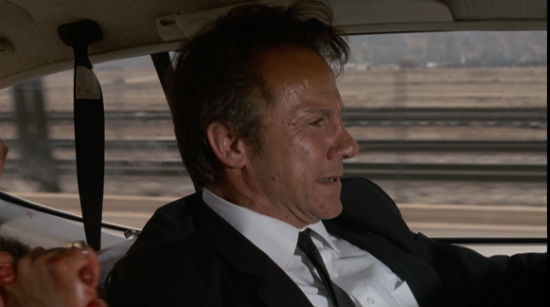
After the title card sequence, we’re thrust into a moment of crisis. Mr. Orange is shot, bleeding out onto the back seat of a car, while Mr. White frantically drives them to the rendezvous point. White is clutching his hand, coaxing Orange through his excruciating pain with words of encouragement. He makes Orange repeat his words like a mantra, as if the act itself will somehow be the man’s salvation. White then repeats “correct!”, almost to himself, and his voice cracks with emotion. He is on the verge of tears, but reins it back in. In his mind, he is Orange’s protector and he must not show any weakness, yet it is obvious that he is devastated by the other man’s injury.
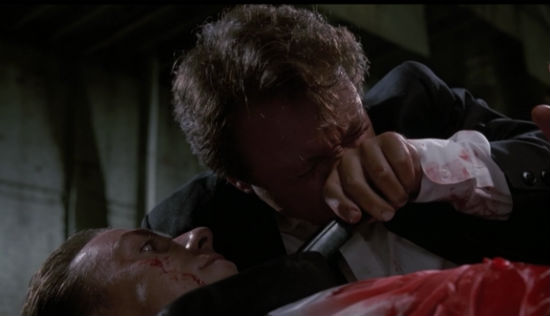
Orange is an incoherent dead-weight in White’s arms as they enter the mortuary/warehouse. White tenderly lays him down on a service ramp and carefully undoes Orange’s fly to release pressure on his bullet wound. At this point, Orange is referring to him by his Christian name, “Larry”, thus demonstrating that at some point, one or both men broke Cabot’s firm rule of anonymity. Orange begs White to hold him, and White obliges, aligning his body next to the injured man’s, cradling his head on his arm. He gently combs Orange’s hair, wipes his brow.
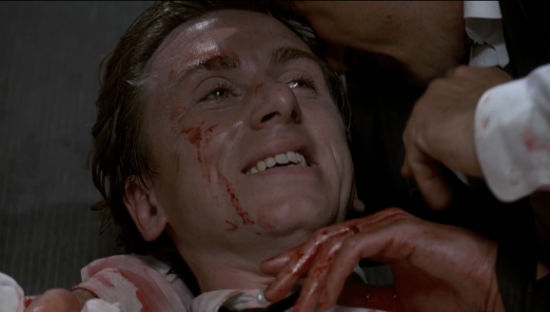
Then, in perhaps the most intimate moment of the entire film, White leans down and whispers something in Orange’s ear. We, the audience, are not made privy to the words he says; only Orange’s giggling reaction. In truth, what White says to him is unimportant. What matters is that we weren’t meant to know; it is a secret that belongs to these two men alone.
At this point, Mr. Pink arrives at the rendezvous, rattled and declaring that the heist was a set-up from the beginning. White takes him into a side room (much to Orange’s protestation), where the two have a conversation about the events that transpired at the diamond wholesalers, dissecting how and why the police evidently knew they were going to be there. White reluctantly admits that the signs point to a rat; he tells a story about how an undercover cop had infiltrated the ranks of a job he’d recently worked on. It is apparent that both he and Pink view police with hatred and disdain, even classifying them as sub-human.

In a flashback sequence, we are given a quick glimpse of Mr. White and Joe Cabot before the heist. It is the single most revealing sequence in terms of establishing Mr. White’s character and motivation in the entire film. Not only are we made aware of his long-standing professional history with Cabot, but also the near-familial nature of their relationship (White calls him “papa”, Cabot affectionately returns with “junior”).
In the course of their conversation, Cabot asks after Alabama, a former partner-in-crime and flame of White’s. White reveals that he and Alabama broke it off: “you push that man/woman thing too long and it gets to you after a while.” Put in simplest terms, White reveals that he has trouble maintaining a clear separation between his personal and professional lives. He becomes too emotionally attached; it is a weakness he recognized in himself, which is why he severed ties with Alabama. Once that attachment forms, all his other allegiances become blurred.
Flash-forward to the warehouse. Pink and White heatedly debate what to do with Orange; Pink argues that Cabot will likely wash his hands of the situation, leaving them on their own. White discloses that Orange had begged to be taken to the hospital, willing to risk jail in order to get medical attention. Pink agrees that it’s his choice to make, as the rest of them won’t be implicated if Orange doesn’t know any of their personal information. This is when White ruefully admits that he told Orange where he was from (“in natural conversation”) and his first name.
Pink balks at this, demanding to know why White would make such a hot-headed blunder. White becomes enraged and defensive, arguing that Orange was his responsibility, and he wasn’t going to deny a dying man the knowledge of his name. Pink shuts him down (“I’m sure it was a beautiful scene”), declaring that they can’t risk a trip to the hospital; White has essentially doomed Orange by sharing too much sensitive information with him. White loses his mind, punching and kicking Pink to the ground. He is obviously emotionally compromised.
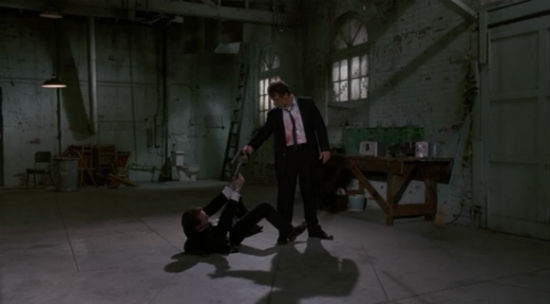
Events unfold to reveal that the rat is none other than Mr. Orange, an undercover LAPD cop. White isn’t present when the audience is made aware of the revelation. We are treated to a flashback; Mr. Orange, aka Detective Freddy Newendyke, meeting with his superior at a diner. He explains that Joe Cabot wants to talk to him about doing a high-risk job; a diamond heist with five other men.
Freddy expresses fondness for the LAPD’s informant, Long Beach Mike, who put in a good word for him with Cabot. Like White, Freddy has difficulty compartmentalizing. With this off-hand comment, we are made aware of his tendency to humanize the men he’s been sent in to bring down. He is the type of cop that gets in too deep when he goes undercover; he is at high risk of “going native”.
In a subsequent scene, Freddy (Mr. Orange) is waiting to catch a ride with Nice Guy Eddie, White, and Pink to a pre-heist meeting held by Joe Cabot. As part of his preparation (which involves a motivational speech to himself in the mirror), we see him pull a prop wedding ring from its hiding place in a jar of change. What Freddy is attempting to add to the fake persona of “Mr. Orange” with this wedding ring is a point hotly debated by film aficionados. In my opinion, it acts as an emotional barrier between him and the other men. The ring signals that he is domesticated, settled, unavailable. It gives him the illusion of responsibility to counter his youthful appearance and habits. (In the words of The Departed’s Captain Ellerby: “Marriage is an important part of getting ahead. It lets people know you’re not a homo. A married guy seems more stable.”) It is a detail that undoubtedly gets noticed by Mr. White.
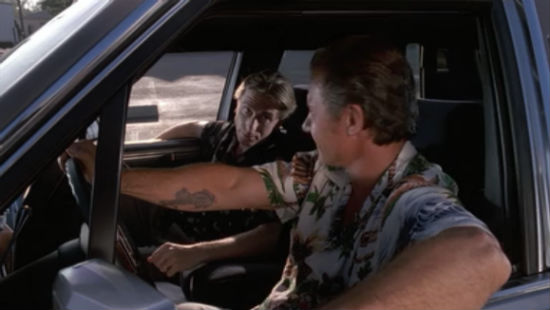
The pre-heist casing scene involving Orange and White together in White’s idling car is very interesting. The two men are relaxed, at-ease; dressed in everyday clothing. White is quizzing Orange on the details of the job, and casually points to a woman crossing the street in front of them, asking: “that girl’s ass?”
What was he attempting to glean from Orange with this flippant question? Orange’s immediate and hyper-heterosexual response (“sitting right here on my dick”) elicits a sharp and almost surprised bark of laughter from White. He’s learned two things: Orange was quick to establish his masculinity, and inadvertently revealed that perhaps he isn’t the type to remain faithful to his (supposed) wife.
White then goes into “old hand” mode, describing in detail which violent acts can be utilized with greatest efficacy if they are met with resistance during the hold-up. Orange listens with a mix of awe and disgust; it is apparent he is starting to like White, against all better judgment.
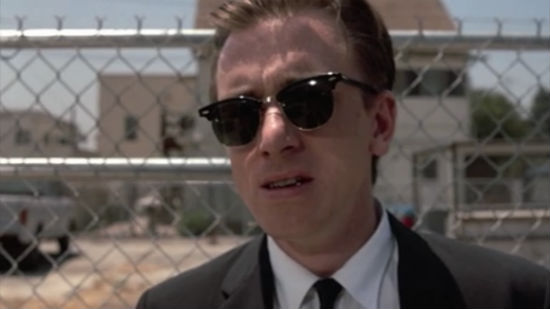
Orange’s escalating inner-conflict about his feelings for White is brought to a head in the post-heist getaway scene. Their driver, Mr. Brown, has suffered a gunshot wound to the head, crashing their car. Orange and White get out of the vehicle, only to be boxed in by an approaching squad car. White positions himself in front of Orange and shoots at the officers behind the windshield, killing them. He is ignorant of the expression of sorrow and desperation on Orange’s face.
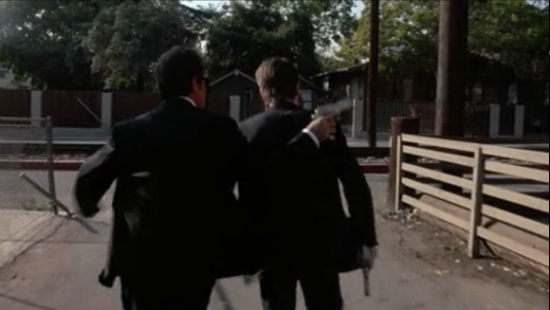
If Detective Freddy Newendyke had been uncompromised, he would have shot White while his back was turned to him, commandeered a vehicle to the rendezvous point, and told the rest of Cabot’s thieves that White had been killed by the police. None of them would have been the wiser; Mr. Brown was already dead and wouldn’t have contradicted his story.
Instead, Orange allows White to shoot his colleagues and lead him away from the scene (hand held protectively against his back). They try to strong-arm a random civilian out of her vehicle, but she unexpectedly draws a weapon from her glove compartment and shoots. Orange is hit in the gut; he fires back without thinking, killing her instantly. In that moment, the cop has completely lost himself to his undercover persona. He’s now no better than the men he led into a trap.

Fast-forward to the warehouse. Orange knows that the LAPD is waiting for the boss, Joe Cabot, to arrive before they move in from where they are waiting a few blocks away. When Cabot does finally make his entrance it is with accusations; he knows that Orange is the rat, the one that tipped off the LAPD to the heist. Orange is almost delirious with blood loss and pain, but he maintains his innocence.
White is aghast at Cabot’s claims. He refuses to believe the man he’s come to care so deeply for is a cop. He demands proof from Cabot, who replies: “with instinct, you don’t need proof.” White draws his weapon on Cabot, his old friend and business associate, and threatens: “Joe, if you kill that man, you die next. Repeat: you kill him, you die next.” In one moment, he’s thrown years of loyalty and allegiance into the wind for a young man he’s only known for a few weeks. Cabot fires, hitting Orange. White shoots back, killing both Cabot and his son Eddie, but not before taking a few bullets himself.
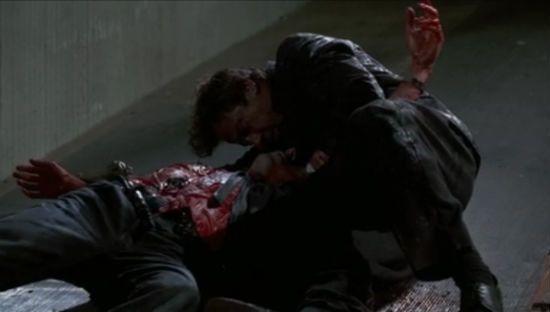
In the gutwrenching final scene, White pulls himself, bloody and moaning with pain, over to where Orange is lying. Both men are drenched in blood, wheezing through their injuries. White lifts Orange’s head and tenderly places it in his lap, caressing his face. Orange reaches up, enveloping White with his arms. Their faces are inches from each other as they form a perfect Pietà.
Sirens blare in the background; Orange knows that his salvation has arrived. White looks down at him, resigned: “I’m sorry kid, it looks like we’re gonna do a bit of time.” Unspoken is the word “together”. (Aside: if Orange hadn’t signalled his unavailability with the wedding ring, I am positive that White would have asked him to replace Alabama as his new partner. His emotional attachment to Orange was that intense.)
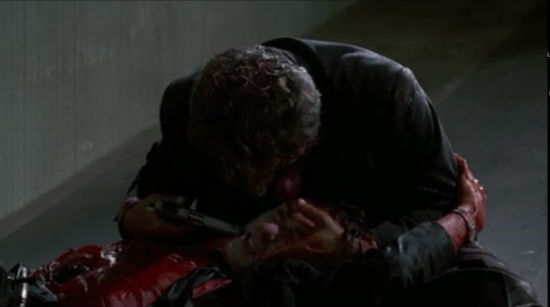
Up to this point, it has been a matter of debate whether Orange’s feelings mirror White’s. His job is now essentially complete; all he has to do is wait for the LAPD to burst through the door and take him to a hospital. Instead, he does the unthinkable: he confesses his true identity to the man he has betrayed. As Orange sobs, “I’m sorry, I’m sorry”, White continues to stroke his face, then howls like an animal, as if his heart has been cleaved in two. White pulls his gun and places it against Orange’s jaw. The police burst into the warehouse; White is now crying, almost hysterical. He pulls the trigger, knowing it will mean his own death; that he and Orange will die together.
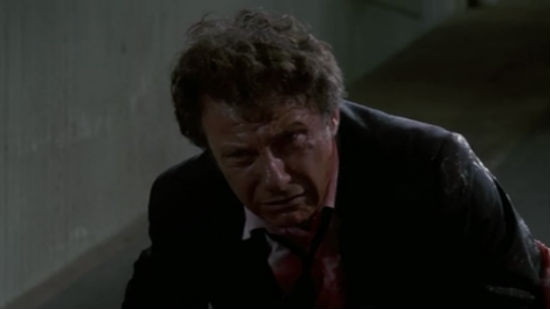
Many of the underlying themes of Orange and White’s relationship can be likened to tenets established by Japanese culture. Orange’s confession was the equivalent of “jingy”; essentially, honor and humanity. It is the thing you know you must do, even if you don’t want to. In his heart, he knew he owed it to White to tell him the truth, regardless of his own safety. He preferred to die with a clean soul than survive knowing that he’d lied to a man who loved him.
White was an individual who strove to live according to a kind of thieves’ “bushido”, a chivalric code that emphasized loyalty and professionalism. Orange knew that in White’s eyes, death was preferable to dishonor, and he was willing to make that sacrifice. It is also a valid interpretation to see White and Orange’s relationship as a modern-day representation of “wakashudo” (a practice engaged in by all members of the Samurai class; when a seasoned warrior took a younger male as a lover who was apprenticed to him in warrior etiquette, martial arts, and the Samurai code).
Throughout the film, White constantly declares himself Orange’s protector and mentor. He feels responsible for Orange’s injuries even though his actions didn’t cause them in any way. They share a level of physical intimacy onscreen that is undeniable; holding hands, caressing, embracing. But most telling is their almost mutual decision to die together on that warehouse floor, when survival was so easily within their reach.
Miramax Film Corp. is re-releasing Reservoir Dogs and Pulp Fiction in theatres to celebrate the 20 year anniversary of Tarantino’s career. Click HERE to find a participating cinema near you.